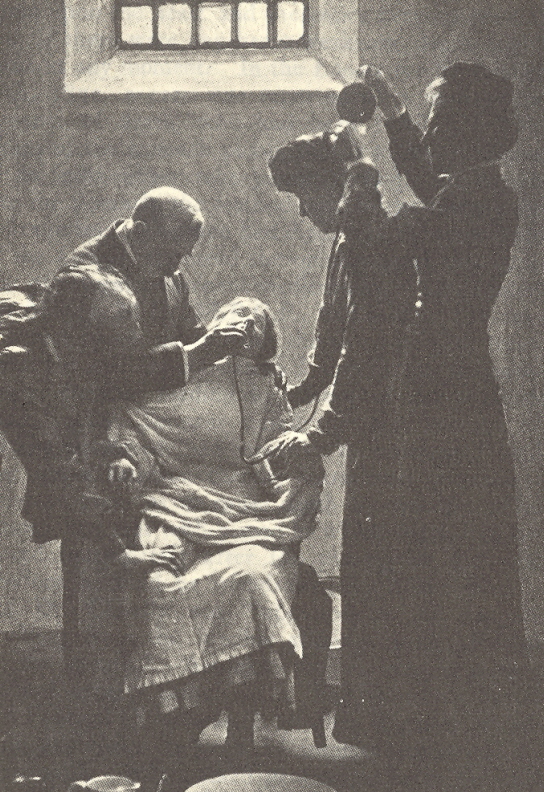What I immediately wrote was three pages of more or less one-line colloquy preceded by an introductory prologue:
Prologue: The Story of the Resident of the Black Pavilion
A: Once upon a time a king in China travels to a town
the residents of which dress exclusively in black.
B: Why are they in black?
A: After living a year in that city without disclosing
his own identity, he gains the confidence of a butcher
who agrees to disclose the mystery of the town to him.
C: He takes the king to the outskirts of the town
to some ruins. There, he places the him in a basket
and lets him be transported to the land
of the Queen of Magical Beings
D: The queen welcomes the king with embraces
but when he wishes to make love to her
she offers him one of her handmaidens instead.
A: He enjoys the handmaiden and returns to the queen,
wooing her again but once more she rejects him
and offers him another of her handmaidens.
C: Returning to her again the Queen seems to promise
him satisfaction but when he moves to touch her
she disappears into thin air along with her attendants
B: and the king finds himself in the same basket
descending to the butcher?
A: In memory of his unrequited love, from then on
he, too, dresses himself in black,
even after he returns home.”
Nothing had to come of this but it would introduce the Black Dome / Queen of Enchanted Beings theme. It gave me four speakers / singers. Because the idea was to dispense with dramatic narrative we could use the cast of four for exchanges like the following:
Episode 1: It exploded in my hand
A: When I opened my hand it exploded…
B: Was that yesterday?
A: No, some years ago, I forget now.
C: I was there with him.
D: The walls were covered with it.
A: It exploded right there on the wall
B: Like graffiti.
A: But black.
C: I was there with him.
D: The walls were covered with it.
Episode 2 could follow and begin to home in on the central figure of the writer and the idea of guilt.
Episode 2: It is only fair
D: We were elsewhere, altogether elsewhere.
A: It was my book. My words.
C: They made him eat his words.
B: It is only fair one should eat one’s words
A: It was a dark country.
C: The room was dark.
B: It was night. It was only fair the room should have been dark.
C: I was there with him.
D: We were all with him.
A: It was, some said, a good book.
D: I told you it was good.
B: Then it is only fair someone should eat it.
That's very brief but it gives an idea of context. The figures are not yet prisoners but they coule be. Then we return to the idea of the Queen:
Episode 3: The Queen of Magical Beings
A: The Queen invited me into her chamber
D: Her pillows, her curtains, her carpets, her scent.
C: I was there with him.
A: I sang her clothes, her eyes, her hair, her body
D: You sang her voice, her hand, her foot, her gesture of welcome and command
B: You wrote of pleasures promised and removed
A: I wrote of the king in his black gown. Of the city of black gowns
C: I was there with him.
B: But when you opened your hand…
A: When I opened my hand it exploded.
B: It is only fair that your hand should have exploded.
None of this was to provide a text as such but to explore ways of fragmentation and recapitulation and to see if anything caught Richard's eye. He liked it all as a first stab - as a technique - but what caught his eye was the idea of the writer being made to physically eat his words.
So there we had an image we could return to - and might yet. But nothing for music yet.


